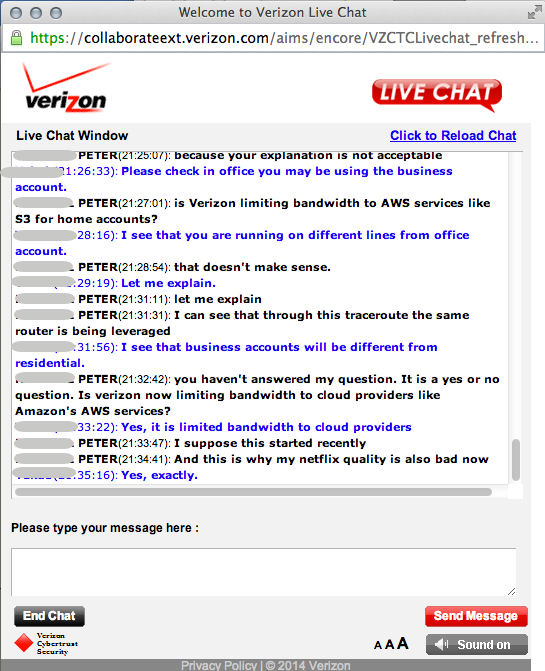
One evening, Raphael noticed a considerable slowdown when using the company's services from home, and realized that both the company president, and himself, used Verizon's FIOS Internet service. He tested the speed at which he could retrieve data from Amazon AWS S3 and got a dismal 40kB/s. After remoting into the office - less than a mile away - the speed bumped up dramatically to 5000kB/s. A clear difference between both connections is one is for residential purposes, while the other is for business.
Around the same time, Raphael had noticed considerable degrading in the quality of Netflix video streaming. Netflix also uses Amazon's AWS services to host content.
Conflicting answers from Verizon
Raphael contacted Verizon to get some answers and eventually ended up on the phone with a customer representative who initially walked him through the typical rigmarole of running a general speed test, rebooting router, checking the system is up to date, and so on. Eventually, the rep ended up providing remote assistance via a screen sharing tool, and this is where it gets interesting.
During an exchange with Raphael, the rep seemingly admits that Verizon is actively "limiting bandwidth to cloud providers."

That would suggest that Verizon is taking full advantage of last month's DC Circuit court decision against the FCC's net neutrality rules, but as it turns out, Verizon has contradicted its own support rep.
"We treat all traffic equally, and that has not changed," a statement from Verizon, obtained by the Washington Post, reads.
"Many factors can affect the speed of a customer's experience for a specific site, including that site's servers, the way the traffic is routed over the Internet and other considerations. We are looking into this specific matter, but the company representative was mistaken. We're going to redouble our representative education efforts on this topic."
FCC's Net Neutrality loss
Last month, January 14, in the case of Verizon v. Federal Communications Commission, the DC Circuit Court struck down net neutrality rules enforced by the regulator. The court found that the FCC does not have the authority to enforce the rules because service providers are not identified as "common carriers."
The FCC can still enforce rules on broadband services up to a point without identifying service providers as common carriers, and the court confirmed this, meaning net neutrality is in no way dead yet.
David Raphael's account & pic source: Dave's Blog
Verizon statement via Washingtington Post: www.washingtonpost.com (by Brian Fung)
Verizon v. Federal Communications Commission decision: www.cadc.uscourts.gov (PDF)













